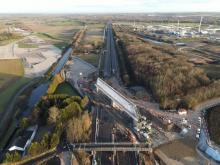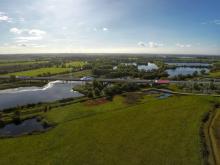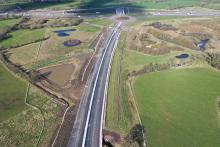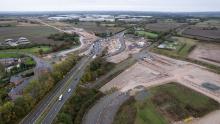Work to install a new bridge for the UK’s busiest rail freight line has been carried out over the A160 at the Port of Immingham. The project forms part of the Port of Immingham Improvement Scheme, a €118.15 million (£88.4 million) series of works being carried out on behalf of Highways England. The project involves upgrading 5km of the A160 from single carriageway to dual carriageway, and constructing a number of new structures. Because of the volume of rail traffic using the stretch of track, the new bridg
Work to install a new bridge for the UK’s busiest rail freight line has been carried out over the A160 at the Port of Immingham. The project forms part of the Port of Immingham Improvement Scheme, a €118.15 million (£88.4 million) series of works being carried out on behalf of 8100 Highways England. The project involves upgrading 5km of the A160 from single carriageway to dual carriageway, and constructing a number of new structures. Because of the volume of rail traffic using the stretch of track, the new bridge had to be installed within a tight 76 hour window.
The engineering team included Costain Engineering Services and specialist contractors such as Walters, Freyssinet , Trackwork and SPI Appleton. In order for the installation to be completed within the designated time, the team had to carry out extensive planning beforehand.
The bridge weighed in at just under 4000tonnes and was slid into place using the Autofoncage method, which utilises four large strand jacks. These jacks push the bridge as they pull against the resistance of the strands, which are fixed into the guide raft and a thrust wall.
The team used 3D and 4D Building Information Modelling which allowed them to visualise, plan and share every piece of information with the wider team, clients and stakeholders. In addition to the 4D modelling, the team also completed a Quantative Schedule Risk Assessment, which helped to identify key areas which needed special attention.
No major civil engineering project comes without its challenges and for this project the stability of the old rail embankment caused the biggest hurdle by extending the period the team needed to carefully backfill the structure. The team overcame this challenge and worked closely with Network Rail to manage the completion of the works within the allocated time.
As well as carrying the country’s busiest freight railway line, the new bridge will allow the new highway link to pass underneath it.
The engineering team included Costain Engineering Services and specialist contractors such as Walters, Freyssinet , Trackwork and SPI Appleton. In order for the installation to be completed within the designated time, the team had to carry out extensive planning beforehand.
The bridge weighed in at just under 4000tonnes and was slid into place using the Autofoncage method, which utilises four large strand jacks. These jacks push the bridge as they pull against the resistance of the strands, which are fixed into the guide raft and a thrust wall.
The team used 3D and 4D Building Information Modelling which allowed them to visualise, plan and share every piece of information with the wider team, clients and stakeholders. In addition to the 4D modelling, the team also completed a Quantative Schedule Risk Assessment, which helped to identify key areas which needed special attention.
No major civil engineering project comes without its challenges and for this project the stability of the old rail embankment caused the biggest hurdle by extending the period the team needed to carefully backfill the structure. The team overcame this challenge and worked closely with Network Rail to manage the completion of the works within the allocated time.
As well as carrying the country’s busiest freight railway line, the new bridge will allow the new highway link to pass underneath it.








